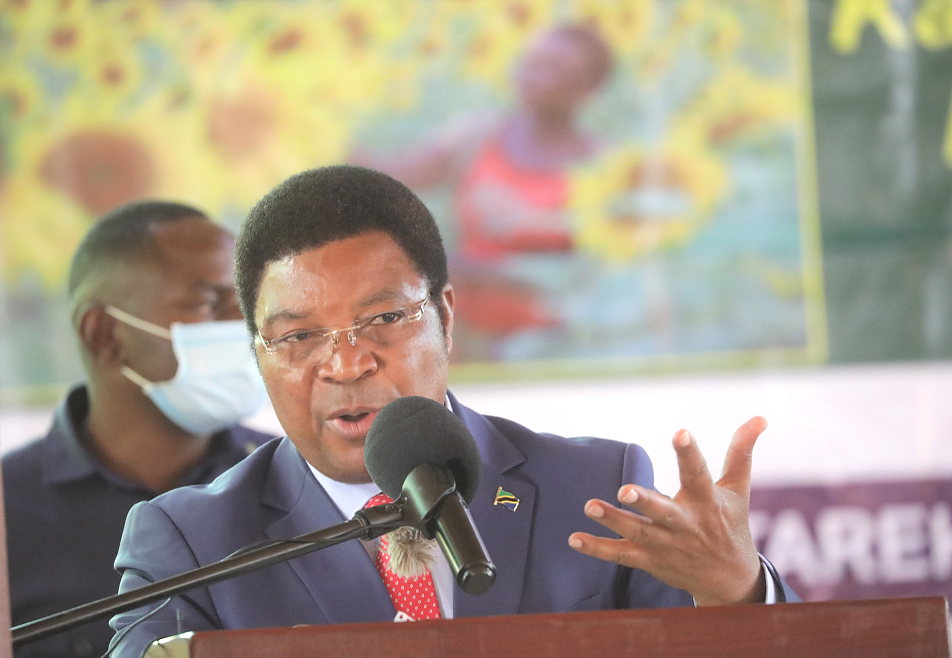The Prime Minister of the United Republic of Tanzania, Hon. Kassim Majaliwa Majaliwa, on the afternoon of June 13, 2021, urged sunflower farmers in the sunflower-growing regions to focus on farming this crop as they can reap significant profits in a short period due to high local and international demand.
Prime Minister Kassim Majaliwa Majaliwa made these remarks while leading a major meeting of stakeholders of the sunflower crop in Singida in the hall of the Catholic Church Center, emphasizing that sunflower farming takes only four months from planting to harvesting.
Prime Minister Majaliwa said there is a huge opportunity in sunflower farming that farmers in Singida, Simiyu, Manyara, and Tabora need to seize. He added that the country’s edible oil production is minimal, with only 290,000 tons produced domestically. This volume only accounts for 45% of the annual edible oil demand, which is 650,000 tons.
“The country imports about 400,000 tons to offset the shortage of edible oil, costing more than 474 billion shillings annually according to current figures,” Prime Minister Majaliwa said.
Besides this motivation, Prime Minister Majaliwa said that due to the importance of cooking oil, the government has devised a strategy to increase the production of oil crops, including peanuts, sunflowers, cotton, groundnuts, and sesame, to become self-sufficient and avoid importing oil from abroad.
Prime Minister Majaliwa said initial steps have been taken to implement strategies to develop oil palm by focusing on the Kigoma region where the government decided to establish a special Oil Palm Research Center at Kihinga. Through this research, significant results in producing superior seedlings capable of producing an average of 5 tons of oil per hectare have started to appear compared to the old type of palm currently producing an average of 1.6 tons per hectare.
“I would like to inform you that by May 2021, a total of 5,630,376 coconut seeds and 1.5 million seedlings have been produced and distributed in the regions of Kigoma, Katavi, Kagera, Rukwa, Mbeya, Coast and Ruvuma,” emphasized Prime Minister Kassim Majaliwa.
Prime Minister Majaliwa said the Singida meeting aims to discuss the agricultural sector’s challenges through the sunflower crop.
“We have gathered here today to discuss the various challenges and opportunities facing the Sunflower Industry to come up with solid strategies that will contribute to increasing production and productivity thus ensuring the availability of cooking oil in the country.”
“In the 2019/2020 year, sunflower production in the country reached 649,437 tons compared to 561,297 tons for the year 2018/2019. Despite the increase in oil crop production in the country, there are still various challenges that need solutions,” Prime Minister Majaliwa was quoted as saying.
Prime Minister Majaliwa listed the challenges to including low productivity in production, caused by poor use of quality inputs (seeds, fertilizers, pesticides, and quality farming tools); lack of production linkage between farmers, oil extraction industries, and service providers of inputs and finance; lack of modern oil extraction technologies and capital to invest in agriculture and industry.
Moreover, apart from these challenges, Prime Minister Majaliwa said the government has devised several strategies through the Ministry of Agriculture. These include investing in research institutions and seed production to increase productivity.
“Considering the importance of quality seeds; the government has increased the budget for the Tanzania Agricultural Research Institute (TARI) from 7.35 billion shillings in 2020/2021 to 11.63 billion shillings in 2021/2022. Also, the budget for the Agricultural Seed Agency (ASA) has increased from 5.42 billion in 2020/2021 to 10.58 billion in 2021/2022 to increase the availability of quality seeds including seeds for oil crops,” emphasized Prime Minister Kassim Majaliwa.
